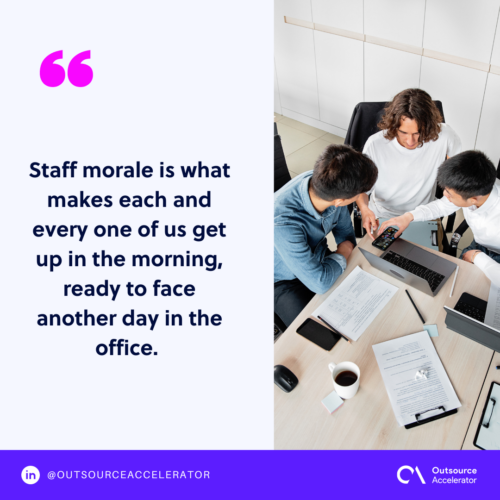Boost remote work staff morale in 5 steps

Maintaining high and consistent staff morale is one of the most important aspects in any work environment. Be it in an office or at home, a workplace is defined by its employees and the company culture.
Make sure that your team, be it on-site or remote, are always in their best condition to perform by understanding staff morale and how to improve it.
Defining staff morale
Staff morale pertains to employees’ overall approach to their work and the company’s culture. It depends on certain internal and external factors, such as:
- Mental, physical, and emotional wellbeing
- Benefits and compensation
- Work culture
- Skill compatibility
Staff morale is what makes each and every one of us get up in the morning, ready to face another day in the office. To put it simply, it’s the employees’ attitude and feelings of fulfillment and determination toward their work.

5 steps in boosting staff morale in a remote work setup
Even in the remote setup, it is important for a company to positively maintain employee morale as it also affects their productivity and quality of work. Here are the steps crucial to boosting staff morale in remote work.
1. Open communication
Two-way communication and feedback are important in maintaining a high level of proficiency and productivity in the workplace. Without these two, employees will hit the wall of stagnation pretty early in their careers, prompting them to job hop.
Open communication in a team ensures that project details are clear and consistent. Not one important detail is kept from the rest of the team.
2. Employee-led initiatives
Employee-led initiatives breed the leaders in a department. This movement ensures that employees are seen for their contributions to the company and are motivated to join any cause that interests them.
3. Meaningful interactions
We spend at least 40 hours working each week, and that’s a lot of time interacting with our teammates, managers, and other coworkers.
Some interactions can easily be dismissed, but some tend to stick with us. These meaningful interactions can boost staff morale in the way major figures can influence us in our daily lives.
4. Treating staff as more than workers
By seeing people beyond their job titles, employees are opening themselves up to the chance of knowing their peers more intimately.
Know the person behind the job title. Being familiar with colleagues will make workdays just a little bit easier to manage. By doing so, we are able to practice compassion in the workplace—something that the world sorely needs at the moment.
5. Employee-centric culture
While reforming a workplace culture into something entirely different might be too drastic, it can benefit some companies having a hard time retaining customers and employees.
An employee-centric culture simply means that businesses should put their employees and their needs first. They should listen and empathize with the members of their organization.
If you’re building a remote team to work alongside your in-house staff, consider Eclaro. They’ll make sure to find the right people to fit in with your company’s culture.
By putting employees first, it will guarantee that they will be more productive, efficient, and understanding in the workplace.

Why staff morale is important in remote work
Working remotely or through a distributed workforce is a dream for many of us—dazzled by the appeal of working in the comforts of one’s home. Even with its downsides, remote work surely beats long commuting times.
But when remote work blues hit, it hits us where it matters the most: efficiency and motivation.
This is why staff morale is important in a remote work environment. When employees’ needs are fulfilled, it pushes employees to work smart and hard. Not only that but fulfilled employees are less likely to quit, thus lowering the company’s turnover rate.
The connection between workplace culture and employee morale
We spend almost 30% of our time in our respective offices. With most of us working 40 hours a week, it’s important that our respective offices have a healthy work culture. Employee morale heavily depends on cues from our working environments.
For instance, if the management shows great interest in their employees’ wellbeing, it’s safe to assume that their culture cultivates and promotes work-life balance.
These two concepts—work culture and employee morale—often work hand in hand in maintaining a productive space for all. If the employee feels fulfilled with their role, they’re most likely to work more effectively, thus boosting productivity in the workplace.
If one of them fails to do their duty, the other one will too. And most of the time, employees get the burden when the system has failed them.

Employee satisfaction, engagement, and morale
To avoid mass resignation, companies should work hard in listening to their workforce’s calls and needs. There are even figures that will help executives in finding pain points and weak spots in their structure, and these are employee satisfaction, engagement, and morale.
Employees can and will speak up if they feel like their workplace system is failing them. From unfair compensation to drastically long hours, when people are backed into a corner, they tend to fight back. The three factors mentioned can help employers identify the problems that need to be addressed and solved in a timely manner.







 Independent
Independent




